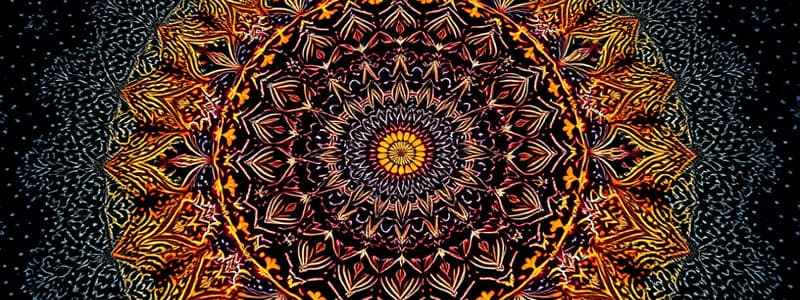Podcast
Questions and Answers
Which of the following is NOT a characteristic of Kalamkari art?
Which of the following is NOT a characteristic of Kalamkari art?
- The word 'Kalam' refers to a pen.
- Red, black, blue, and yellow are commonly used colors.
- It originated in the state of Rajasthan. (correct)
- It uses non-toxic colors extracted from natural sources.
Mandala art can be found in various cultures and traditions.
Mandala art can be found in various cultures and traditions.
True (A)
What is the primary technique used in dot painting?
What is the primary technique used in dot painting?
Using small, distinct dots of color in patterns to create an image.
Illusion art is also known as ______ art.
Illusion art is also known as ______ art.
What is the name for the small pieces of material used in mosaic art?
What is the name for the small pieces of material used in mosaic art?
Match the art forms to their origin locations:
Match the art forms to their origin locations:
Monochrome landscapes use a single base color with varying shades created by adding white or black paint.
Monochrome landscapes use a single base color with varying shades created by adding white or black paint.
What is the significance of the word 'mandala' in Sanskrit?
What is the significance of the word 'mandala' in Sanskrit?
Flashcards
Mandala Art
Mandala Art
A type of geometric art using repeated circular patterns.
Illusion Art
Illusion Art
Art that creates optical illusions, tricking the viewer's eye.
Dot Painting
Dot Painting
Painting technique using small distinct dots to create an image.
Mosaic Art
Mosaic Art
Signup and view all the flashcards
Monochrome Landscape
Monochrome Landscape
Signup and view all the flashcards
Kalighat Painting
Kalighat Painting
Signup and view all the flashcards
Kalamkari
Kalamkari
Signup and view all the flashcards
Pichwai Art
Pichwai Art
Signup and view all the flashcards
Study Notes
Mandala Art
- Mandala art uses repeated circular patterns to create designs
- Has deep spiritual or cosmic meaning in many cultures
- "Mandala" means "circle" in Sanskrit
Illusion Art (OP Art)
- Also known as optical illusion art
- Tricks the viewer's eye into seeing something not there
- Used to describe paintings that create illusions of objects or scenes
Dot Painting (Pointillism)
- A painting technique using small, distinct dots of color
- Colors often include red, yellow, blue, green, and white
- Helpful for increasing creativity, skill, focus, stress relief, patience, and attention to detail
Mosaic Art
- Decoration of a surface using small, variously colored pieces of material ("tesserae")
- Common materials include stone, glass, and ceramic
- Used to create images with assembled pieces of colored glass or stone
Monochrome Landscape
- Uses a single base color (e.g., tint or shade)
- Changing the base color with white or black to create tints and shades
- Commonly depicts nature scenes (e.g., countryside mountains, valleys, rivers, trees)
Kalighat Painting
- Style of Indian paintings originating in the 19th century
- Bold outlines, vibrant colors, and minimal backgrounds
- Depicted mythological stories, Hindu deities, and everyday life
Kalamkari Painting
- Originates from Andhra Pradesh and Telangana, India
- "Kalam" means "pen" in the local language
- Uses non-toxic colors extracted from natural sources (e.g., plants, herbs)
Pichwai Art
- Originates from Nathdwara, Rajasthan, India
- Around 400 years old
- Sanskrit words "Pich" (back) and "Wai" (hanging)
- Depicted on textiles, found in temples, and used in homes; often adorned with gold details and rich colors (e.g., red, green, yellow, white, and black)
- Figures have large eyes, broad noses and heavy bodies; this art form has multiple borders with unique and intricate designs.
Studying That Suits You
Use AI to generate personalized quizzes and flashcards to suit your learning preferences.




